Bing Crosby (48 page)
Authors: Gary Giddins

(Over the next decade Bing would be caricatured visually, vocally, or both in numerous animations, not always kindly. In depicting
him as a cad, the parodies echoed the plots of the Sennett shorts in which he abducts women from their suitors. In a May 1936
cartoon,
Let It Be Me,
Mr. Bingo is a spats-wearing cock of the walk, who croons for PBC [the Poultry Broadcasting Company] and seduces and abandons
an innocent hen in favor of a curvaceous French capon. The hen’s dumb-cluck boyfriend avenges her by smashing a radio and
punching Mr. Bingo before marrying the hen. They have five chicks, one of whom chirps
bu-bu-bu-boo.
Merrie Melodies quickly followed it with
Bingo Crosbyana,
this time prompting a suit in which Bing’s attorney, John O’Melveny, argued that the title character was depicted as a “vainglorious
coward.” The complaint had no motive beyond harassment. Warners cartoonists gave Bing a wide berth for a couple of years,
during which his representatives developed a better sense of humor. Bing was back on the drawing board by 1938, albeit less
derisively.)
A blanket skewering of radio itself provided Bing with his opportunity to return to Hollywood in style. The talk of Broadway
in early 1932 was William Ford Manley’s play
Wild Waves,
which satirically traced the rise of a broadcast star. One of its producers, D. A. Doran, was affiliated with the story department
at Paramount Pictures and persuaded the studio to purchase the film rights. By February Paramount let it be known it was considering
Bing for the lead role. A New York
Daily News
columnist cheered, “Should be Bing’s meat!”
63
Paramount negotiated with Sennett and Everett to obtain Bing’s participation and signed him to a one-picture deal — a deal
that would have Bing working his way west in just about every Paramount-Publix theater en route.
* * *
As his star rose during the first six months of 1932, Bing began to extricate himself from a surfeit of agents. Early in the
year, Ev was taking 10 percent of his income while Marchetti was taking another 20 percent. Bing was obliged to the lawyer
for getting him out of the mess at the Grove and vetting his CBS contract, but he now rankled at paying him a fifth of his
earnings when they were on opposite coasts and Marchetti no longer did much, if anything, for him. Having organized Bing Crosby,
Ltd., with himself, Bing, and Barris as equal partners, Marchetti demanded $100,000 for his third. Bing wired another Los
Angeles attorney, John O’Melveny, to handle the situation. O’Melveny represented Sue Carol and once helped Dixie with her
Fox contract; he had seen Bing at the Grove and was later introduced to him by Sue at a party she gave for Bing and Dixie
when they were married. His negotiations with Marchetti resulted in the astonishingly low settlement of $15,000 and established
O’Melveny as a permanent member of the Crosby organization, representing Bing in all legal matters for the rest of their lives.
Edward Small presented more of a problem. Bing had stopped paying him his 10 percent, claiming that Small verbally released
him from their 1930 contract on the condition that Bing settle with him upon his return to Los Angeles. Small denied ever
relieving Bing of his obligations. When the Paramount deal was rumored, he sued for $20,000, based on his estimate of Bing’s
two-year earnings as $200,000 (“I wish that were true,” Bing told a reporter);
64
when the movie deal was confirmed, he enlarged his demand by an additional $85,000. Newspaper accounts feigned surprise that
such sums could be earned from crooning, and Bing bristled at having his finances publicized. After one of his Paramount salary
checks was attached by the sheriff, Bing settled out of court.
Bing needed a publicist. His brother Ted (third-oldest of the siblings, after Larry and Everett) had made a game try in December
1931 from his home in Spokane, pitching Bing’s story to
Time.
Ted received a smug response from a member of the editorial department with the improbable name Eleanor Hard: “I am afraid
the Bing Crosby suggestion won’t be suitable for FORTUNE. Thanks for your suggestion, however.”
65
Fortune”?
He wrote back that he had meant
Time,
which recently ran a story on Alice Joy, “The Dream Singer,” a vaudevillian who did a daily fifteen-minute show. “The incidents
in her rise to fame are not nearly so startling as those to be found in a history of Bing’s,” he argued: “[Bing] heads the
list of radio singers — he is in his third month at the New York Paramount — his motion picture ‘shorts’ are breaking records
— his records are best sellers — and his latest success is in song writing.”
66
Though Ted harbored aspirations as a manager and writer, he was disinclined to leave Washington. Brother Larry, on the other
hand, was raring to go, and Bing gave him the job of redefining his reputation as one of professionalism and sobriety. The
FDR era was about to commence. Within a year Prohibition would be repealed. There was no reason to drink anymore — except
maybe the Depression.
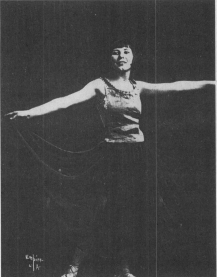
Doreen Wilde (above) appeared with dancer Bobby Thompson in the same vaudeville show
(Syncopation Ideas)
that introduced Crosby and Rinker to California audiences, 1925.
Alison McMahan Collection
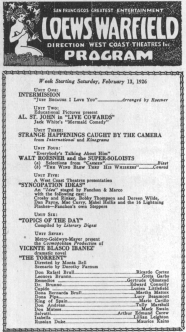

On January 1, 1926, the
Spokane Chronicle
reported on Al and Bing’s first variety tour.
Bing Crosby Collection, Foley
Center, Gonzaga University
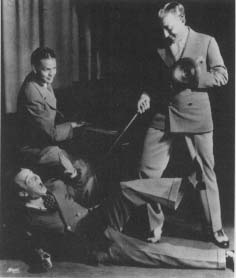
The Rhythm Boys at play: Al Rinker at the piano, Harry Barris on the ground, Bing with cymbal and baton.
Mickey Kapp Collection

Paul Whiteman’s photograph helped sell the sheet music for the Rhythm Boys’ biggest hit, “Mississippi Mud,” 1927.
Gary Giddins Collection

“Am I too suave or sveldt… Brush by Fuller.” Bing, mustachioed and natty, had this picture taken in New York and inscribed
it to his brother Ted.
Howard Crosby Collection
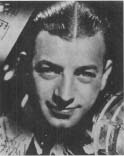
Gus Arnheim led the famous orchestra at the Cocoanut Grove.
Elsie Perry Collection
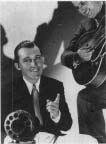
A publicity photo of Bing and Eddie Lang, the highest-paid sideman in the country before his untimely death.
Gary Giddins Collection